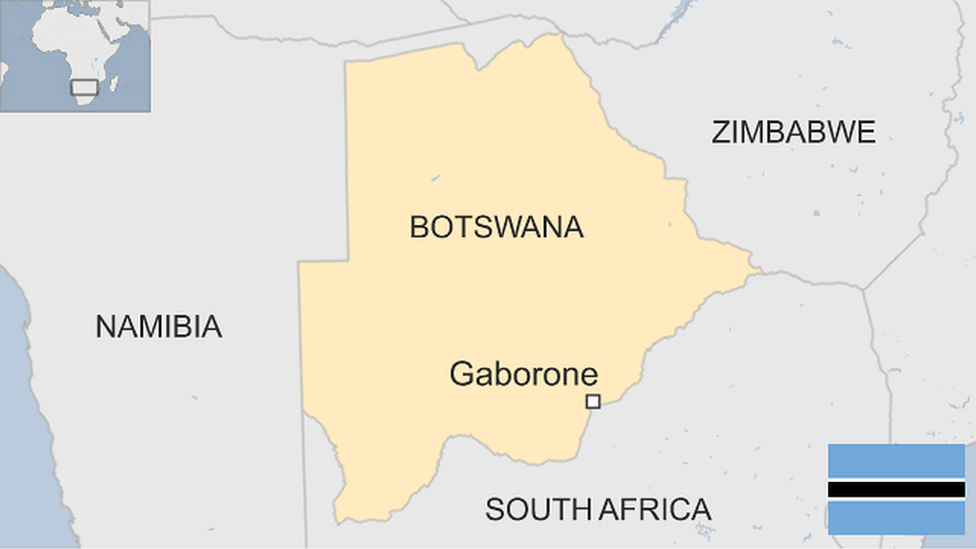Botswana: From sleepy backwater to global diamond hub
- Published
Lucy Burton reports
A sleepy African city is rapidly being turned into a major global trading centre.
After decades of just mining rough diamonds, Botswana's capital Gaborone now cuts, polishes and sells the precious stones itself.
Most people may be unable to find Gaborone on a map, but it's becoming a regular destination for global diamond traders and that's changing the economy here.
This dusty, low-rise city is being transformed, as high-rise flats and hotels are constructed and businesses bet it will mean a boost for them.
Diamond-related companies are setting up factories in anticipation of the global mining giant De Beers relocating its sales business here from London.
Soon, $6bn (£4bn) worth of diamond trades will take place here, attracting buyers from around the world.
'Made sense'
A local company has already held an auction. A new diamond park has been built to host spin-off businesses.
One of them - a branch of an Indian firm called Shrenuj - has recently opened and is making jewellery partly using Botswana's diamonds.
Dozens of people, mainly young women, are hunched over small workstations, peering through magnifying glasses as they shape, smooth and carve various bits of metal and stone into shiny jewellery.
"We can source rough diamonds in Botswana," the manager, Kim Lenni, says. "It made sense for us to open a jewellery factory. We're able to supply the local market and the US from Botswana."
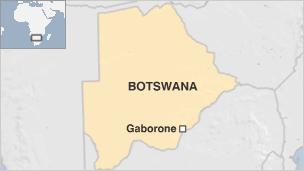
He says sales are going well.
Diversifying
Other companies - totally unrelated to diamonds - say they're also seeing a jump in business.
At Gaborone's main bus station, passengers are shoving bags and suitcases on to ageing buses as hawkers wander round selling drinks and snacks.
From this chaotic, noisy, bustling place, services travel right across this vast, arid country and beyond.
Abel Monnakgotla, who runs a local transport company, AT&T, has 50 buses and runs routes to neighbouring South Africa and Namibia.
He's now invested in new, shiny minibuses and says he's earning money by ferrying diamond traders around.
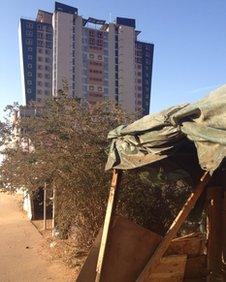
More and more high-rise buildings are cropping up on the landscape
"We have diversified. We've gone into car rentals and airport shuttles," he says.
"Most of the benefit has previously been at a macro level - infrastructure, roads. But as entrepreneurs we haven't had a direct benefit. We will now benefit directly."
'The world expects'
Not everyone is finding it as easy.
A world away from the bus station, on the edge of Gaborone, is the quiet, green Phakalane golf resort.
It is perhaps the kind of place a diamond trader may well like to while away a spare few hours.
While hopeful his business will do well out of visiting diamond traders, the managing director, Lesang Mahang, is having some problems.
"The world is expecting world class service, the standards they expected in London where the diamond centre used to be located," he says.
But he cannot find a kosher chef in Botswana who can make food the way some people - say, from diamond hub Tel Aviv - demand.
Power cuts
There are some broader concerns about the country's readiness.
There are no direct flights to Gaborone from Europe or the United States, meaning journeys to the country have to go through another African city, usually Johannesburg.
A regular rolling programme of power cuts means hotel guests may be forced to shower in the dark and cafes unable to boil water.
Evening entertainment can be limited - restaurants tend to close by 22:00, there aren't many bars, and there are few street taxis to get around.
Is the country ready?
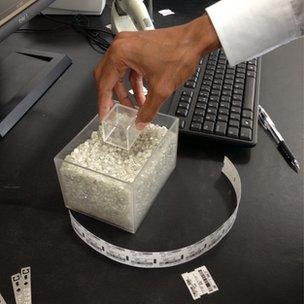
Some $6bn worth of diamond trades will take place here
Alex Monchusi from the Chamber of Commerce says many businesses aren't yet ready to take advantage of the new diamond work.
"The first time this was announced, I said to the government we were certainly very excited... [but] we felt it was a lot of work to be done and too little time to do it in.
"It is very similar to a country winning the right to host the Olympic Games - you've got a big opportunity to host it at world standards, but you have little resources to do it, not much time to do it."
The government, though, is confident any problems will be fixed, and it will mean a big difference.
Eric Molale, the Cabinet Secretary, says the diamond move is "a once in a lifetime opportunity" for Botswana.
"The ultimate objective of the government is to create a diamond pipeline that is value adding to the nation - not just mine and sell."
- Published26 June 2013
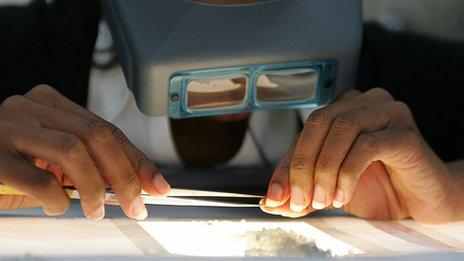
- Published15 August 2012

- Published11 November 2024
